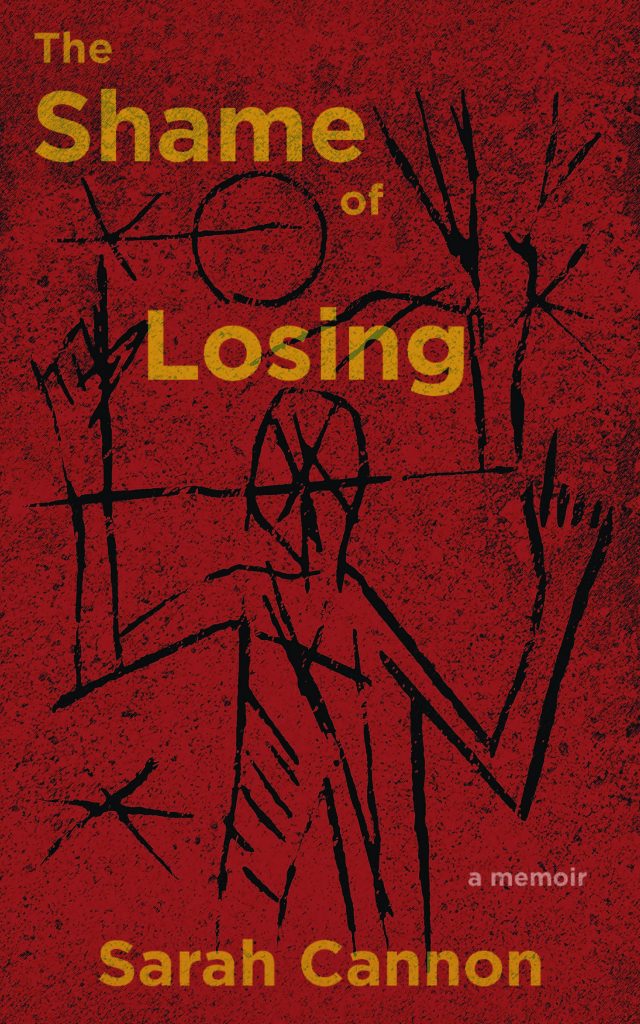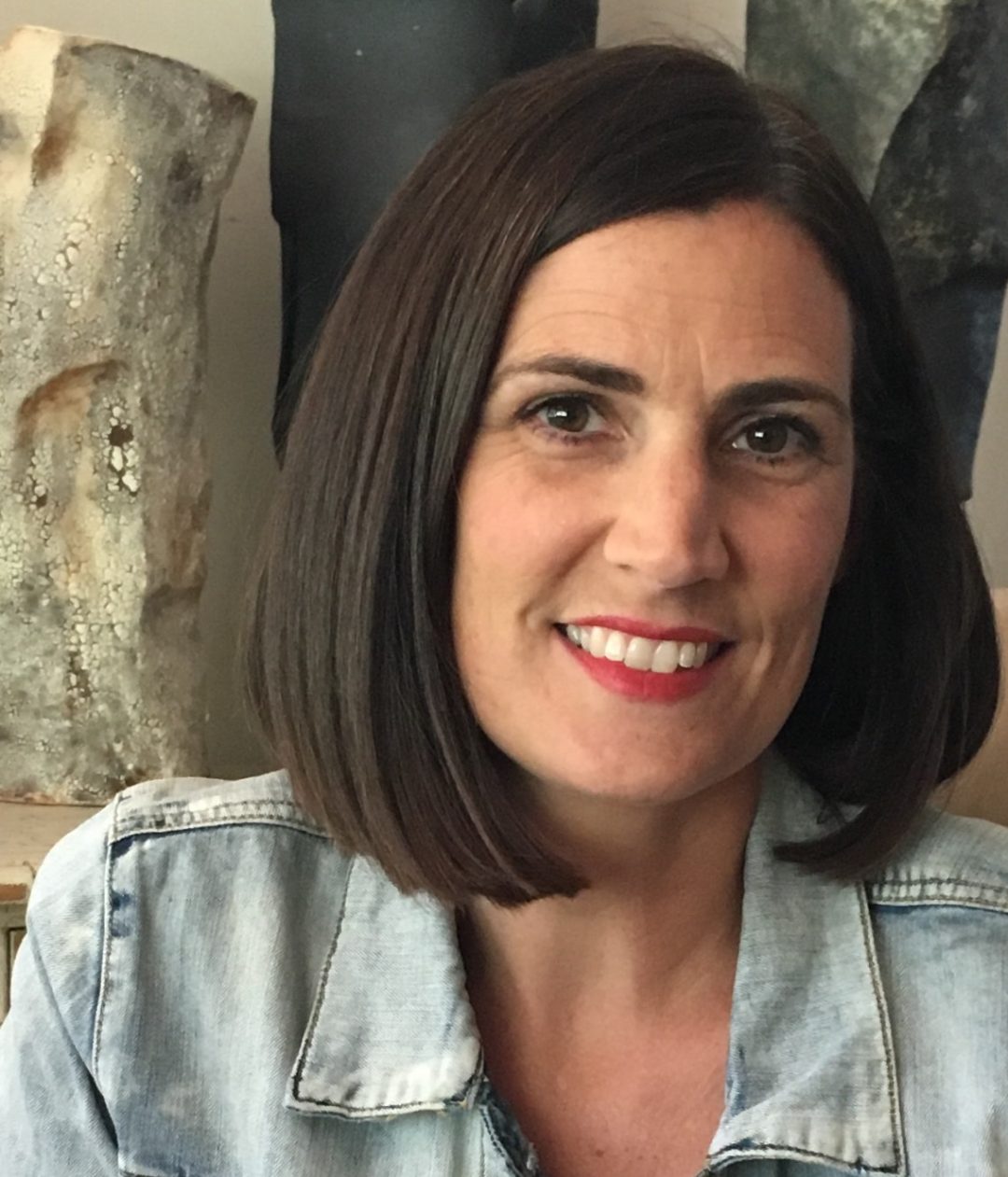
The Shame of Losing
Sarah Cannon
160 pages
Red Hen Press, $16.95
I sit next to my mom in a hospital conference room. There are gray walls and a long gray table, where we are all sitting, eating catered deli sandwiches. Each seat is occupied by an older woman in her sixties or seventies. My mom, with her brown curlicue hair and colorful T-shirt, seems to be the youngest caregiver here. In another room, the survivors of stroke, brain injury, and aphasia also sit and eat sandwiches, catching up or playing checkers. They are husbands, fathers, grandparents. In the caretaker room, the women chat about mundane aspects of their lives: a bad knee, a bothersome mother-in-law, the local news. One woman swivels her attention over to my mom: “We haven’t seen you here in awhile. How are you doing? How is your husband? Have you been taking time for yourself?” As my mom opens her mouth to speak, the women sit around her nodding, their eyes squinting in knowing empathy.
Traumatic brain injury is not a very understood or visible disability in our world. My family’s story is very different from Sarah Cannon’s, which she recounts in her new memoir The Shame of Losing. But every family has an important narrative found in a book of letters, notebooks, internal and external hardship. While many stories stay private, rarely spoken about outside of support groups, Sarah Cannon lets us in. She gives us permission to read her candid journal entries following her husband’s arboriculture accident that resulted in a traumatic brain injury. In about 150 pages, The Shame of Losing compiles scenes from Cannon’s life in dynamic parts. As we read, we process these events with her. She reclaims the genre of diaristic emotional scrawl while also recalling her experience. The act of writing this book can be interpreted as an attempt of self-healing.
Cannon brings the issue of our fragile bodies, our fragile lives, up to a personal microscope. However, this memoir does more than just highlight the aftereffects of a workplace injury. Cannon wonders throughout: do people really change over the course of their lives? Sometimes Cannon thinks, yes, we do, and “other times, I think our core is our core.”
The Shame of Losing begins immediately in the moments before the accident. Cannon recalls herself as a suburban mother volunteering at a local arts center on October 30th, 2007. She received a frantic call from her husband’s arborist coworker, trying to explain the accident, caused by a fallen tree branch: “his cheekbones are sideways.” Throughout Losing, “sideways” becomes Cannon’s least favorite word. She goes on to describe the feeling of entering the Level 1 trauma center for serious injuries: “sitting there alone, I felt abandoned by the world.” There is a sideways nature to the experience of grief. Nothing seems straightforward anymore, no part of our day can ever be predicted. Cannon sees her husband Matt in the hospital bed, his “skull crumpled, a blown-out eye, busted eye sockets, and a collapsed nose.” This is physical evidence of a much more invisible injury, an invisible story.
As readers of Cannon’s writing, we must always be prepared for a drastic change in tone and time. In this memoir, Cannon also writes about her happy Seattle childhood in poetic prose; her young love and marriage to Matt; and rearing two children together. These sections seem like diversions or distractions, but they lay real context: life was simple once. One moment, Matt and Sarah are in an airplane dealing with a fussy toddler and infant, and in the next, Sarah navigates the ICU: “I clenched my stomach in preparation for something I didn’t understand.” A journal entry from November 2007 switches to a letter to Matt that she will never send: “Hey, remember when we were first dating and. . . .” Then, we read a script for a fake suburban drama, starring Sarah, explaining to the neighbors how Matt lost his sense of smell. Mundane details shock and stir: winter air and the appearance of Christmas lights upon coming home from 42 days in the hospital. Forms shift again, when we are presented with an auto-fiction short story Cannon wrote, titled: ‘Man in the Woods with a Headache.’ By collaging notebooks, letters, screenplay, and short story, Cannon redefines the typical ingredients for a grief memoir.
I recognized my own lonely experiences in The Shame of Losing. Cannon discusses how many of her friends kept a distance after the accident, or simply lost interest. She reflects on the old Matt, and how the “cute OT girls” would never “know my husband was once a helicopter pilot and that we used to call him a human compass.” One of the hardest parts of traumatic brain injury is letting go of our old lives and the person from “before.” Cannon wonders, and so do I, how do we mourn someone who is still here? A spritely, handy husband morphs into a loner with “brain drain.” As one year goes by, “Matt has fooled everyone that he’s okay.” But the healing of traumatic brain injury is a lifelong process. In a therapy session, Matt discloses that he doesn’t know how to feel love. In a metaphor that swims throughout the book like the word “sideways,” he describes that he’s in the desert. He’s so thirsty, and he knows there’s water somewhere, but he can’t drink it.
A major strength of this memoir is Cannon’s passionate release of her voice, her shame. She speaks to us like we are confidantes over the phone late at night. We get to hear about the tedious woes of Workers Compensation, piles of paperwork, and pinching pennies. We nod our heads as Cannon complains about the easiness of other people’s problems and her jealousy of them. We listen as she screams in the hospital: “Get me the eff out of here!” In The Shame of Losing, we see a woman who is not a perfect mother, not a perfect wife. The family unravels even as they try to move on, going on vacations, watching their kids in school talent shows.
In my favorite moments, Cannon describes small, insignificant memories of solitude. She bites off a corner of one of Matt’s Oxy pills, and drives around aimlessly, listening to Frank Ocean. She goes to the grocery store after the kids go to sleep and lovingly picks out a tub of sour cream. She drives to the hospital, just one more time, trying to reclaim a ghost.
Seemingly stitched together with journal pages, The Shame of Losing disclosed so much, yet many details were kept. This is only the tip of an iceberg of Sarah Cannon’s truth. I hope that with books like The Shame of Losing, the public will become more familiar with the impact and realities that traumatic brain injury has on families. Sarah Cannon is not a celebrity or a famous author. This is her first book. Through the genre of nonfiction, the stories of regular people gain power.
Back in the conference room with my mother, I get up to leave, throwing away our paper plates, meeting up again with my dad. We leave out the back door of the hospital, back to a world that can never nod its head and understand. I leave you with Cannon’s advice: “The best thing a supporter can do is understand the strangling effect the culture’s insistence on “getting over it” can have on mental health. It’s OK to be sad, and grief is ongoing. Have faith in your truth. Accept that there are no real answers. Healing can happen, if you want it.”
_____________________
Bio: Delia Rainey is a musician and writer from the Midwest. She currently studies nonfiction in the MFA program at Columbia College Chicago. Her prose and poems have been featured in Hooligan Magazine, DIAGRAM, Peach Mag, and many others. Ghost City Press released her mini chapbook Private Again in August 2018. She tweets often: @hellodeliaaaaa.

